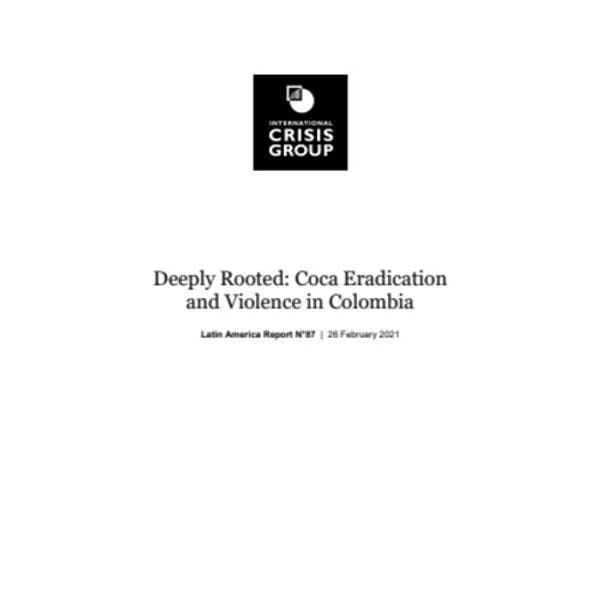International Crisis Group
Deeply rooted: Coca eradication and violence in Colombia
Latin America Report N°87 / International Crisis Group
Coca stands at the heart of a fierce debate over Colombia’s worsening rural insecurity. The plant’s leaves are the sole raw material from which cocaine, an illegal drug that generates outlandish profits and finances armed and criminal groups, can be manufactured. Colombian President Iván Duque argues that the whole narcotic supply chain – from coca cultivation to global cocaine trafficking – is the scourge behind rising massacres, forced displacement and assassinations of community leaders in Colombia. With cultivation hitting new highs in recent years, Bogotá has vastly expanded campaigns that involve sending in the army and police to pull up or otherwise eradicate coca crops. It also threatens to restart aerial fumigation. Yet an approach based on forceful eradication of coca, which the U.S. has stoutly backed, tends to worsen rural violence, while failing to reduce drug supply. A new strategy is needed that persuades coca farmers to abandon a plant that offers a stable income and an attractive alternative to other legal crops.
Dismantling the illicit drug economy was one of six main planks of the landmark 2016 peace accord between the state and the guerrilla Revolutionary Armed Forces of Colombia (FARC). That accord promised to institute a nationwide crop substitution program enabling roughly 200,000 coca-growing families to pursue other legal businesses. It sought to sever links between the insurgency and drug trafficking, while establishing state authority in pockets of the country where criminal rule and poverty had long allowed cocaine production to thrive.
Four years later, few of those promises have been met. Coca cultivation began rising to historical highs during peace negotiations, driven in part by the expectation that any eventual accord would benefit coca farmers who pledged to substitute their crops. This trend worsened as the government struggled to meet the promises made to farmers. Bogotá has not been able to transform the economic fundamentals that make coca – fast-growing and destined for a loyal international market – such a reliable crop. New armed groups have swooped in to control the supply chain the FARC left behind. An array of hustlers, guerrillas and criminals vie for control over the purchase and refining of coca, as well as trafficking routes out of the country.
